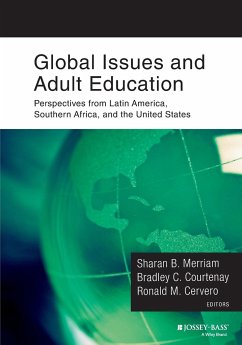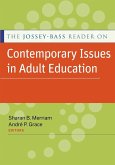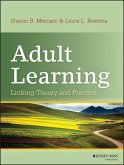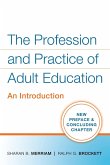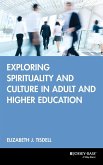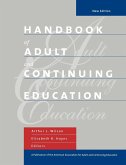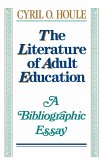Sharan B Merriam
Global Issues and Adult Education
Perspectives from Latin America, Southern Africa, and the United States
Sharan B Merriam
Global Issues and Adult Education
Perspectives from Latin America, Southern Africa, and the United States
- Broschiertes Buch
- Merkliste
- Auf die Merkliste
- Bewerten Bewerten
- Teilen
- Produkt teilen
- Produkterinnerung
- Produkterinnerung
Global Issues and Adult Education brings together seven years of cutting-edge research and analysis from the Cyril O. Houle Scholars in Adult and Continuing Education. These emerging leaders in the field investigate the importance of adult education in responding to the challenges of global issues. The book is divided into five sections, each of which examines one overarching topic-globalization and the market economy, marginalized populations, environment and health, community empowerment, and lifelong learning and educational systems. Each section begins with an introduction that provides a…mehr
Andere Kunden interessierten sich auch für
![The Jossey-Bass Reader on Contemporary Issues in Adult Education The Jossey-Bass Reader on Contemporary Issues in Adult Education]() The Jossey-Bass Reader on Contemporary Issues in Adult Education53,99 €
The Jossey-Bass Reader on Contemporary Issues in Adult Education53,99 €![Adult Learning Adult Learning]() Sharan B. MerriamAdult Learning57,99 €
Sharan B. MerriamAdult Learning57,99 €![The Profession and Practice of Adult Education The Profession and Practice of Adult Education]() Sharan B MerriamThe Profession and Practice of Adult Education52,99 €
Sharan B MerriamThe Profession and Practice of Adult Education52,99 €![Adult Education in the American Experience Adult Education in the American Experience]() Harold W StubblefieldAdult Education in the American Experience64,99 €
Harold W StubblefieldAdult Education in the American Experience64,99 €![Exploring Spirituality and Culture in Adult and Higher Education Exploring Spirituality and Culture in Adult and Higher Education]() Elizabeth J TisdellExploring Spirituality and Culture in Adult and Higher Education49,99 €
Elizabeth J TisdellExploring Spirituality and Culture in Adult and Higher Education49,99 €![Handbook of Adult and Continuing Education Handbook of Adult and Continuing Education]() Handbook of Adult and Continuing Education108,99 €
Handbook of Adult and Continuing Education108,99 €![The Literature of Adult Education The Literature of Adult Education]() Cyril O HouleThe Literature of Adult Education66,99 €
Cyril O HouleThe Literature of Adult Education66,99 €-
-
-
Global Issues and Adult Education brings together seven years of cutting-edge research and analysis from the Cyril O. Houle Scholars in Adult and Continuing Education. These emerging leaders in the field investigate the importance of adult education in responding to the challenges of global issues. The book is divided into five sections, each of which examines one overarching topic-globalization and the market economy, marginalized populations, environment and health, community empowerment, and lifelong learning and educational systems. Each section begins with an introduction that provides a framework for understanding the overarching issues and summarizes the chapters in the section.
Hinweis: Dieser Artikel kann nur an eine deutsche Lieferadresse ausgeliefert werden.
Hinweis: Dieser Artikel kann nur an eine deutsche Lieferadresse ausgeliefert werden.
Produktdetails
- Produktdetails
- Verlag: Wiley
- Seitenzahl: 560
- Erscheinungstermin: 3. März 2006
- Englisch
- Abmessung: 254mm x 178mm x 30mm
- Gewicht: 1040g
- ISBN-13: 9781119000617
- ISBN-10: 1119000610
- Artikelnr.: 41479729
- Herstellerkennzeichnung
- Libri GmbH
- Europaallee 1
- 36244 Bad Hersfeld
- gpsr@libri.de
- Verlag: Wiley
- Seitenzahl: 560
- Erscheinungstermin: 3. März 2006
- Englisch
- Abmessung: 254mm x 178mm x 30mm
- Gewicht: 1040g
- ISBN-13: 9781119000617
- ISBN-10: 1119000610
- Artikelnr.: 41479729
- Herstellerkennzeichnung
- Libri GmbH
- Europaallee 1
- 36244 Bad Hersfeld
- gpsr@libri.de
SHARAN B. MERRIAMis professor of adult education at the University of Georgia.
Foreword (Gail McClure).
Preface.
The Editors.
The Contributors.
PART ONE: GLOBALIZATION AND THE MARKET ECONOMY.
1. Adult Education and Social Transformation (Zelda Groener).
2. Adult Education and the Empowerment of the Individual in a Global
Society (Cecilia Amaluisa Fiallos).
3. Development of Educators in Relation to Globalization in Latin America
(Juan José Madrigal Goerne).
4. Globalization and the Future of Critical Adult Education (John D.
Holst).
5. In the Belly of the Beast: Globalization and Adult Education in the
United States (Fred M. Schied).
6. Adult Education and the Mass Media in the Age of Globalization (Talmadge
C. Guy).
7. Framing a Critical Discourse on Globalization (Daniel V. Folkman).
PART TWO: MARGINALIZED POPULATIONS.
8. Is Adult Education an Agent for Change or Instrument of the Status Quo?
(Vivian W. Mott).
9. Race, Politics, and Economic Self-Sufficiency in a Culture of Welfare
Reform (Mary V. Alfred).
10. Women Facing Internal Armed Conflict: The Challenge for Adult Education
(Mónica Arboleda Giraldo).
11. Using Visual Methods to Bring People to the Center (Doria Daniels).
12.Women's Learning and Development in the Workplace (Laura L. Bierema).
13. Mainstreaming Marginalized Populations Through Adult Education
Programs: The Herdboys in Lesotho (Mantina V. Mohasi).
14. Disability as an Issue of Marginalization (Tonette S. Rocco).
15. The Intersection of Education, Hegemony, and Marginalization Within the
Academy (Vanessa Sheared).
16. Breaking Down Barriers: Challenging the Hegemony of Privileged
Positionalities (LisaM. Baumgartner).
PART THREE: ENVIRONMENT AND HEALTH.
17. The Role of the Church in Combating HIV/AIDS (Irene Ellen Chadibe).
18.Western and Indigenous African Knowledge Systems Affecting Gender and
HIV/AIDS Prevention in Botswana (Peggy Gabo Ntseane).
19. Aligning Health Promotion and Adult Education for Healthier Communities
(Barbara J. Daley).
20. "He Hits Me and My World Shatters. . . .": How Could Adult Education
Possibly Make a Difference Here? (M. Carolyn Clark).
21. The Greening of the Adult Education Academy (Edward W. Taylor).
22. Environmental Adult Education: Producing Polychromatic Spaces for a
Sustainable World (Robert J. Hill).
23. Adult Education on the Environmental Margin: A Call for Action (Barbara
McDonald).
PART FOUR: COMMUNITY EMPOWERMENT.
24. Adult Education and Social Capital: Supporting Communities in the
Context of HIV/AIDS (Gillian Attwood).
25. Transformative Learning: A Community Empowerment Conduit for African
American Women (Juanita Johnson-Bailey).
26. Adult Education for Community Empowerment: Toward the Possibility of
Another World (Rita María Ceballos).
27. Noninstrumental Objectives for Contemporary Popular Education (Julián
Alberto González).
28. Adult Literacy Education and Empowerment in Africa: Problems and
Prospects (Tonic Maruatona).
29. Literacy as a Human Right: Research and Policies (Vera Masagão
Ribeiro).
30. Improving the Effectiveness of Volunteers in Community-Based Adult
Literacy Education (Alisa Belzer).
PART FIVE: LIFELONG LEARNING AND EDUCATIONAL SYSTEMS.
31. Radical Mutuality and Self-Other Relationship in Adult Education
(Marsha Rossiter).
32. Low-Income Adult Learners in Higher Education: Politics, Policies, and
Praxis (Catherine A. Hansman).
33. Research in Popular and Adult Education in Latin America (Mercedes
Ruiz).
34.Ways of Organizing Knowledge for Teaching in Youth and Adult Education
(María del Carmen Lorenzatti).
35. Building a Learning Community for Parents and Directors of Educational
Establishments in Chile (Javier Corvalán).
36. Popular Education and Lifelong Learning: An Integrative Approach to
Poverty, Development, and Change (Peter G. Malvicini).
37. Challenges in Setting up Systems for Assessing Prior Experiential
Learning in Higher Distance Education (Rita Kizito).
38. The Role of "Learning-Committed Leaders" in Lifelong Learning (Andrea
D. Ellinger).
PART SIX: CONCLUSION.
39. The Role of Adult Education in Addressing Global Issues (Sharan B.
Merriam, Bradley C. Courtenay, Ronald M. Cervero).
Name Index.
Subject Index.
Preface.
The Editors.
The Contributors.
PART ONE: GLOBALIZATION AND THE MARKET ECONOMY.
1. Adult Education and Social Transformation (Zelda Groener).
2. Adult Education and the Empowerment of the Individual in a Global
Society (Cecilia Amaluisa Fiallos).
3. Development of Educators in Relation to Globalization in Latin America
(Juan José Madrigal Goerne).
4. Globalization and the Future of Critical Adult Education (John D.
Holst).
5. In the Belly of the Beast: Globalization and Adult Education in the
United States (Fred M. Schied).
6. Adult Education and the Mass Media in the Age of Globalization (Talmadge
C. Guy).
7. Framing a Critical Discourse on Globalization (Daniel V. Folkman).
PART TWO: MARGINALIZED POPULATIONS.
8. Is Adult Education an Agent for Change or Instrument of the Status Quo?
(Vivian W. Mott).
9. Race, Politics, and Economic Self-Sufficiency in a Culture of Welfare
Reform (Mary V. Alfred).
10. Women Facing Internal Armed Conflict: The Challenge for Adult Education
(Mónica Arboleda Giraldo).
11. Using Visual Methods to Bring People to the Center (Doria Daniels).
12.Women's Learning and Development in the Workplace (Laura L. Bierema).
13. Mainstreaming Marginalized Populations Through Adult Education
Programs: The Herdboys in Lesotho (Mantina V. Mohasi).
14. Disability as an Issue of Marginalization (Tonette S. Rocco).
15. The Intersection of Education, Hegemony, and Marginalization Within the
Academy (Vanessa Sheared).
16. Breaking Down Barriers: Challenging the Hegemony of Privileged
Positionalities (LisaM. Baumgartner).
PART THREE: ENVIRONMENT AND HEALTH.
17. The Role of the Church in Combating HIV/AIDS (Irene Ellen Chadibe).
18.Western and Indigenous African Knowledge Systems Affecting Gender and
HIV/AIDS Prevention in Botswana (Peggy Gabo Ntseane).
19. Aligning Health Promotion and Adult Education for Healthier Communities
(Barbara J. Daley).
20. "He Hits Me and My World Shatters. . . .": How Could Adult Education
Possibly Make a Difference Here? (M. Carolyn Clark).
21. The Greening of the Adult Education Academy (Edward W. Taylor).
22. Environmental Adult Education: Producing Polychromatic Spaces for a
Sustainable World (Robert J. Hill).
23. Adult Education on the Environmental Margin: A Call for Action (Barbara
McDonald).
PART FOUR: COMMUNITY EMPOWERMENT.
24. Adult Education and Social Capital: Supporting Communities in the
Context of HIV/AIDS (Gillian Attwood).
25. Transformative Learning: A Community Empowerment Conduit for African
American Women (Juanita Johnson-Bailey).
26. Adult Education for Community Empowerment: Toward the Possibility of
Another World (Rita María Ceballos).
27. Noninstrumental Objectives for Contemporary Popular Education (Julián
Alberto González).
28. Adult Literacy Education and Empowerment in Africa: Problems and
Prospects (Tonic Maruatona).
29. Literacy as a Human Right: Research and Policies (Vera Masagão
Ribeiro).
30. Improving the Effectiveness of Volunteers in Community-Based Adult
Literacy Education (Alisa Belzer).
PART FIVE: LIFELONG LEARNING AND EDUCATIONAL SYSTEMS.
31. Radical Mutuality and Self-Other Relationship in Adult Education
(Marsha Rossiter).
32. Low-Income Adult Learners in Higher Education: Politics, Policies, and
Praxis (Catherine A. Hansman).
33. Research in Popular and Adult Education in Latin America (Mercedes
Ruiz).
34.Ways of Organizing Knowledge for Teaching in Youth and Adult Education
(María del Carmen Lorenzatti).
35. Building a Learning Community for Parents and Directors of Educational
Establishments in Chile (Javier Corvalán).
36. Popular Education and Lifelong Learning: An Integrative Approach to
Poverty, Development, and Change (Peter G. Malvicini).
37. Challenges in Setting up Systems for Assessing Prior Experiential
Learning in Higher Distance Education (Rita Kizito).
38. The Role of "Learning-Committed Leaders" in Lifelong Learning (Andrea
D. Ellinger).
PART SIX: CONCLUSION.
39. The Role of Adult Education in Addressing Global Issues (Sharan B.
Merriam, Bradley C. Courtenay, Ronald M. Cervero).
Name Index.
Subject Index.
Foreword (Gail McClure).
Preface.
The Editors.
The Contributors.
PART ONE: GLOBALIZATION AND THE MARKET ECONOMY.
1. Adult Education and Social Transformation (Zelda Groener).
2. Adult Education and the Empowerment of the Individual in a Global
Society (Cecilia Amaluisa Fiallos).
3. Development of Educators in Relation to Globalization in Latin America
(Juan José Madrigal Goerne).
4. Globalization and the Future of Critical Adult Education (John D.
Holst).
5. In the Belly of the Beast: Globalization and Adult Education in the
United States (Fred M. Schied).
6. Adult Education and the Mass Media in the Age of Globalization (Talmadge
C. Guy).
7. Framing a Critical Discourse on Globalization (Daniel V. Folkman).
PART TWO: MARGINALIZED POPULATIONS.
8. Is Adult Education an Agent for Change or Instrument of the Status Quo?
(Vivian W. Mott).
9. Race, Politics, and Economic Self-Sufficiency in a Culture of Welfare
Reform (Mary V. Alfred).
10. Women Facing Internal Armed Conflict: The Challenge for Adult Education
(Mónica Arboleda Giraldo).
11. Using Visual Methods to Bring People to the Center (Doria Daniels).
12.Women's Learning and Development in the Workplace (Laura L. Bierema).
13. Mainstreaming Marginalized Populations Through Adult Education
Programs: The Herdboys in Lesotho (Mantina V. Mohasi).
14. Disability as an Issue of Marginalization (Tonette S. Rocco).
15. The Intersection of Education, Hegemony, and Marginalization Within the
Academy (Vanessa Sheared).
16. Breaking Down Barriers: Challenging the Hegemony of Privileged
Positionalities (LisaM. Baumgartner).
PART THREE: ENVIRONMENT AND HEALTH.
17. The Role of the Church in Combating HIV/AIDS (Irene Ellen Chadibe).
18.Western and Indigenous African Knowledge Systems Affecting Gender and
HIV/AIDS Prevention in Botswana (Peggy Gabo Ntseane).
19. Aligning Health Promotion and Adult Education for Healthier Communities
(Barbara J. Daley).
20. "He Hits Me and My World Shatters. . . .": How Could Adult Education
Possibly Make a Difference Here? (M. Carolyn Clark).
21. The Greening of the Adult Education Academy (Edward W. Taylor).
22. Environmental Adult Education: Producing Polychromatic Spaces for a
Sustainable World (Robert J. Hill).
23. Adult Education on the Environmental Margin: A Call for Action (Barbara
McDonald).
PART FOUR: COMMUNITY EMPOWERMENT.
24. Adult Education and Social Capital: Supporting Communities in the
Context of HIV/AIDS (Gillian Attwood).
25. Transformative Learning: A Community Empowerment Conduit for African
American Women (Juanita Johnson-Bailey).
26. Adult Education for Community Empowerment: Toward the Possibility of
Another World (Rita María Ceballos).
27. Noninstrumental Objectives for Contemporary Popular Education (Julián
Alberto González).
28. Adult Literacy Education and Empowerment in Africa: Problems and
Prospects (Tonic Maruatona).
29. Literacy as a Human Right: Research and Policies (Vera Masagão
Ribeiro).
30. Improving the Effectiveness of Volunteers in Community-Based Adult
Literacy Education (Alisa Belzer).
PART FIVE: LIFELONG LEARNING AND EDUCATIONAL SYSTEMS.
31. Radical Mutuality and Self-Other Relationship in Adult Education
(Marsha Rossiter).
32. Low-Income Adult Learners in Higher Education: Politics, Policies, and
Praxis (Catherine A. Hansman).
33. Research in Popular and Adult Education in Latin America (Mercedes
Ruiz).
34.Ways of Organizing Knowledge for Teaching in Youth and Adult Education
(María del Carmen Lorenzatti).
35. Building a Learning Community for Parents and Directors of Educational
Establishments in Chile (Javier Corvalán).
36. Popular Education and Lifelong Learning: An Integrative Approach to
Poverty, Development, and Change (Peter G. Malvicini).
37. Challenges in Setting up Systems for Assessing Prior Experiential
Learning in Higher Distance Education (Rita Kizito).
38. The Role of "Learning-Committed Leaders" in Lifelong Learning (Andrea
D. Ellinger).
PART SIX: CONCLUSION.
39. The Role of Adult Education in Addressing Global Issues (Sharan B.
Merriam, Bradley C. Courtenay, Ronald M. Cervero).
Name Index.
Subject Index.
Preface.
The Editors.
The Contributors.
PART ONE: GLOBALIZATION AND THE MARKET ECONOMY.
1. Adult Education and Social Transformation (Zelda Groener).
2. Adult Education and the Empowerment of the Individual in a Global
Society (Cecilia Amaluisa Fiallos).
3. Development of Educators in Relation to Globalization in Latin America
(Juan José Madrigal Goerne).
4. Globalization and the Future of Critical Adult Education (John D.
Holst).
5. In the Belly of the Beast: Globalization and Adult Education in the
United States (Fred M. Schied).
6. Adult Education and the Mass Media in the Age of Globalization (Talmadge
C. Guy).
7. Framing a Critical Discourse on Globalization (Daniel V. Folkman).
PART TWO: MARGINALIZED POPULATIONS.
8. Is Adult Education an Agent for Change or Instrument of the Status Quo?
(Vivian W. Mott).
9. Race, Politics, and Economic Self-Sufficiency in a Culture of Welfare
Reform (Mary V. Alfred).
10. Women Facing Internal Armed Conflict: The Challenge for Adult Education
(Mónica Arboleda Giraldo).
11. Using Visual Methods to Bring People to the Center (Doria Daniels).
12.Women's Learning and Development in the Workplace (Laura L. Bierema).
13. Mainstreaming Marginalized Populations Through Adult Education
Programs: The Herdboys in Lesotho (Mantina V. Mohasi).
14. Disability as an Issue of Marginalization (Tonette S. Rocco).
15. The Intersection of Education, Hegemony, and Marginalization Within the
Academy (Vanessa Sheared).
16. Breaking Down Barriers: Challenging the Hegemony of Privileged
Positionalities (LisaM. Baumgartner).
PART THREE: ENVIRONMENT AND HEALTH.
17. The Role of the Church in Combating HIV/AIDS (Irene Ellen Chadibe).
18.Western and Indigenous African Knowledge Systems Affecting Gender and
HIV/AIDS Prevention in Botswana (Peggy Gabo Ntseane).
19. Aligning Health Promotion and Adult Education for Healthier Communities
(Barbara J. Daley).
20. "He Hits Me and My World Shatters. . . .": How Could Adult Education
Possibly Make a Difference Here? (M. Carolyn Clark).
21. The Greening of the Adult Education Academy (Edward W. Taylor).
22. Environmental Adult Education: Producing Polychromatic Spaces for a
Sustainable World (Robert J. Hill).
23. Adult Education on the Environmental Margin: A Call for Action (Barbara
McDonald).
PART FOUR: COMMUNITY EMPOWERMENT.
24. Adult Education and Social Capital: Supporting Communities in the
Context of HIV/AIDS (Gillian Attwood).
25. Transformative Learning: A Community Empowerment Conduit for African
American Women (Juanita Johnson-Bailey).
26. Adult Education for Community Empowerment: Toward the Possibility of
Another World (Rita María Ceballos).
27. Noninstrumental Objectives for Contemporary Popular Education (Julián
Alberto González).
28. Adult Literacy Education and Empowerment in Africa: Problems and
Prospects (Tonic Maruatona).
29. Literacy as a Human Right: Research and Policies (Vera Masagão
Ribeiro).
30. Improving the Effectiveness of Volunteers in Community-Based Adult
Literacy Education (Alisa Belzer).
PART FIVE: LIFELONG LEARNING AND EDUCATIONAL SYSTEMS.
31. Radical Mutuality and Self-Other Relationship in Adult Education
(Marsha Rossiter).
32. Low-Income Adult Learners in Higher Education: Politics, Policies, and
Praxis (Catherine A. Hansman).
33. Research in Popular and Adult Education in Latin America (Mercedes
Ruiz).
34.Ways of Organizing Knowledge for Teaching in Youth and Adult Education
(María del Carmen Lorenzatti).
35. Building a Learning Community for Parents and Directors of Educational
Establishments in Chile (Javier Corvalán).
36. Popular Education and Lifelong Learning: An Integrative Approach to
Poverty, Development, and Change (Peter G. Malvicini).
37. Challenges in Setting up Systems for Assessing Prior Experiential
Learning in Higher Distance Education (Rita Kizito).
38. The Role of "Learning-Committed Leaders" in Lifelong Learning (Andrea
D. Ellinger).
PART SIX: CONCLUSION.
39. The Role of Adult Education in Addressing Global Issues (Sharan B.
Merriam, Bradley C. Courtenay, Ronald M. Cervero).
Name Index.
Subject Index.

